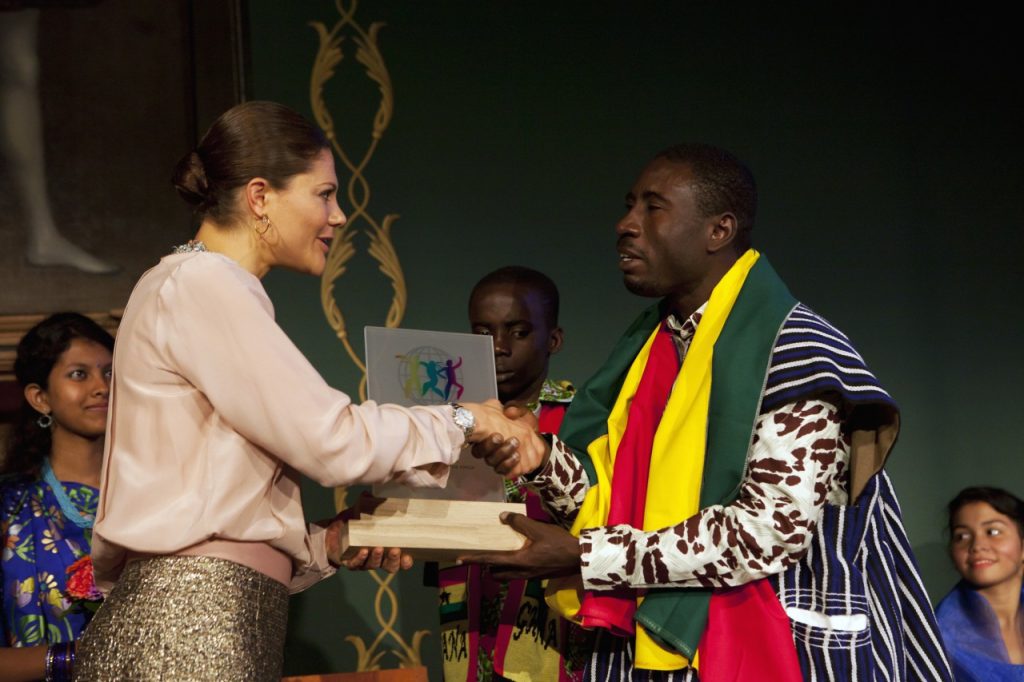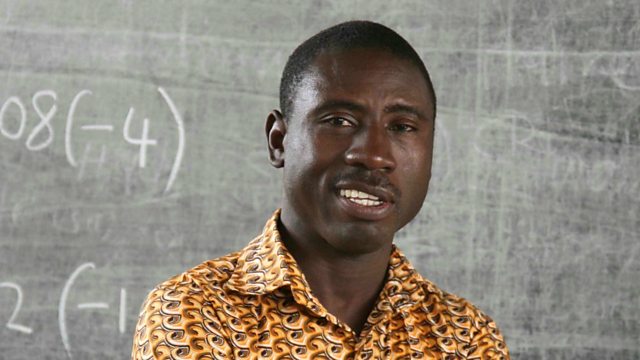Lake Volta, the world’s largest man-made lake is the source of Ghana’s hydroelectric power that keeps the electricity running for many. A beautiful source of life, it is also a rich fish source known to local fishermen who paddle the river everyday to earn a living.
It is an open secret however, that children are working on the river, enslaved helping the fishermen. Children from families in neighbouring communities are continuously being approached by fishermen who promise education and a better life which is far from the truth according to stories retold by social workers, the police, the government and even victims of the practice themselves.
One such victim is James Kofi Annan, a 42-year-old man who now runs a non-profit organisation called Challenging Heights to save the children who are unfortunately living the life he once lived as a fishing child slave on Lake Volta.
‘I remember that we were six who were taken together and that night before we left, I remember the other boys joined. To persuade us to go they gave my father money. But at the point of transaction I had no idea about anything. All I knew was that I had been taken away. You’d think I would be in distress when I was taken away but no, I wasn’t distressed.
On the contrary, I think I was happy I was being taken away because the stories that these fishermen come with are very happy ending stories. An example is, they will say ‘we are going to educate him, give the child food to eat.
So for the parents it works because the fact that their struggling to take care of these large number of children and someone comes to say they can do what they can’t afford to do in addition to the fact that in our culture, it is normal for a child to stay with other people to be taken care of, it made sense to them and to me.
I was happy I was going off to have a better life.’
Though that changed very quickly.
‘I realised that this wasn’t going to be a better life when we were on our way to Lake Volta.
I was hungry. So I told the man I was hungry and then he slapped me. A very hefty slap on the face. Then I thought to myself, are you not the person who is promising me that everything is going to be well and I am going to get a lot of food to eat, I am going to attend school? If I am hungry and I am just telling you, and you slap me? It was very baffling to me.
He looked around and tried to hatch a plan to escape but it was too late.
‘It was a rickety bus that we were travelling in on a dusty road, six hours into the journey…it was impossible for me to find my way back. I was trapped.
I was very upset until we got to the lake and I was fascinated by the lake. How people were paddling and children were paddling the canoes too. I remember actually wanting to join in to know what the experience was like.’
Work on Lake Volta
However, the anxiety returned when the real work started.
The real work James refers to revolves around a series of tasks such as scooping water from the boats that leaked, casting and pulling in the net, mending nets, removing fishes from the net and diving to disentangle the fishing net if it ever got caught underwater.
‘That first day I certainly remember it on the tee. It was dawn when I was awakened by cold water poured on me. It was traumatic. We started work from 3am and ended at 8pm. We worked every day of the week. It was just constant working.
When you get sick or tired, you’re either left to die or you survive to work. They beat you if you refuse to work and when you make a mistake. It was bad.
I’ve seen children die. I’ve seen children die as a result of the harsh conditions we worked under, I’ve seen children die from very preventable diseases. Out of the six I was trafficked with only half of us survived. The boys that didn’t survive died after diving.’
When Lake Volta was created between 1961 and 1965, the process caused trees in the area to go under creating an underwater forest that has not only survived till today but has also contributed to the area’s ecosystem.
Some stumps are visible while others aren’t and for those that aren’t visible, it can make fishing on Lake Volta very difficult and dangerous.
‘When you are casting the net you don’t see them. Then it gets entangled. When this happens, instead of the fisherman to tug it, tear it and replace it, they choose to nominate a boy to go down into the water and remove it. So that it doesn’t tear.’
According to James, a fishing net for the fisherman is extremely expensive. It costs a $200 equivalent in Ghana’s currency, the Ghana Cedis. Whereas, for a child who is trafficked, it costs $30.
Essentially, the net was worth more than the life of a young child.
‘In a lot of cases you will find that, because of the frequent changes in the current of the lake, the body of the net moves onto the child and then that causes the entrapment.’
A family reunion
‘I tried to escape several times. I was tortured when I was found. It was a form of deterrent to other children who tried to escape.
I only successfully escaped from enslavement when the church I went to came to pick up all children who were named after a prominent religious leader from the community, for his funeral.’
At the funeral, James met his mother again.
‘I saw my mother at the funeral, she was happy to see me but I didn’t want to talk about what had just happened to me. It was too painful and I thought it would be destructive if I told her.
But my mum later told me that she knew I was going to run away and for the first time in two years, I had seen a vehicle.
It was a truck loaded with yam. The men driving spoke my language so I went over to help them. Because I spoke the same language as them, when they were done fixing their vehicle I asked to join them and they said yes.
I went back to my hometown to my family house and when my parents came, my mother was very happy and my father was very very angry.
He was angry because of economics. If I was working, he would get something from it. But my mother wanted me to go to school and she admired people who spoke English and so that’s all I wanted to achieve, for her.’
Now, back home, still a young boy, James had to go school but first he had to raise the money himself as there was none to pay for his fees.
‘When I came back, my mum after 12 children was so weak, was sick and couldn’t work. My dad was also an old man and couldn’t work as much to take care of me. If I wanted to go to school, then I had to fend for myself.
I knew the skills involved with fishing so I continued fishing part-time on the weekends and then we had a lot of wild mangoes and coconuts to pluck and sell. I was virtually living in the wild because I was rejected by the father and the community. So I did everything.
I went to people’s houses and asked if I could weed their compounds in exchange for some money. I went to people’s homes to get firewood so that they could use it to cook, so that I could eat. I did all these things just to achieve one thing, an education.
I was determined because I just wanted to speak English to make my mother happy.
Rumours vs resilience
‘When I started school I didn’t even know how to write the alphabet or numbers. I was determined regardless of all the pain, the rumours about me.’
The rumours he spoke of were about what his body looked like upon return from the lake.
‘I had so many problems. I came back with a foul stench. I had ear problems, boils and other issues that I brought from my situation.
I didn’t understand anything they were doing in school because they had to speak English and that’s why I didn’t want to speak about my situation. The reaction of the children and even some of the teachers towards me was very embarrassing.
But inwardly, I was so focused that I didn’t care what they thought.’
A breakthrough came for James in English, when he refused to speak his local dialect to passersby in the town to challenge himself to speak his new second language.
I started speaking in English and I made all the mistakes you can make when learning a new language. But it worked.’
In 7th grade, James topped his class.
‘No one was able to beat me in any subject and I set a record in that school and it remains unbroken.’
From that day on, James just kept raising the bar. He moved on in school, graduated from university and then got a job in a bank. Sitting one day, bringing his journey full circle, he began to realise that there is indeed a chance at life for the children who remained slaves to fishermen on Lake Volta.
Challenging Heights
‘Having gone through all these pains, and going through basic education, high school and then college and now a masters degree, I’ve achieved what I wanted to achieve and even more. English and more.
I remembered that there were so many other children who were caught up in the same enslavement I was in, who also wanted to ran away, who also wanted to be rescued, who also wanted support, who also wanted to go to school, who wanted medical attention, who wanted some care but they didn’t have the opportunity I have had. That’s why I started Challenging Heights.
I created a platform for the enslaved children to have the opportunity to be heard, to go to school, to be supported and to be me or even more than me. So far it’s working.’

‘In the beginning I used to go there, to the lake myself to rescue children. It’s a very risky business. I face death threats all the time. Now, my staff go there. The threats are unnerving for my family. Personally, I don’t know what worse situation I could go through after everything so it doesn’t worry me at all but I have a family. So it worries me for that reason.
I take precautions for their safety; I have security and I have put security measures in place in my home. I also have security around me when I am out there. I am lucky to have a friend who bought a good car for me so I don’t have to join the public transport and it has some security features so that helps me.’
James made a huge sacrifice for Challenging Heights but he knew he was doing the right thing; securing the future of a former child slave’s life.
‘I devoted 60% of my salary towards this project because there’s no greater sacrifice than the sacrifice children are making and so if I put 60% of my salary towards that project, that is nothing.
Assuming I didn’t go to school, I would have earned less than 10% of what I was earning. So in my head, if I was retaining 40% of what I earned, that is nothing.’
After rescuing children from Lake Volta, Challenging Heights enrolls them in a series of programmes which allow the children to pace themselves to go through rehabilitation successfully.
‘We bring them to a rehabilitation centre where medical care, counselling, and then we integrate them.
It’s not every child that can go through the process to be reintegrated on his own, the way I went through my own. I must admit, I’m 42 now and I still live with some of the trauma. For some of the memories, no matter who you are, I will not tell you.’
James whose organisation has rescued at least 1,500 children so far says stamping out child enslavement and trafficking on Lake Volta should continue to be a priority.
In the next five years, Challenging Heights aims to make a huge statement that the organisation will lead the charge to end the trafficking on Lake Volta.
‘I really believe in what we are doing. Anytime we rescue another child, I feel like I’ve rescued myself.’
James Kofi Annan has been nominated to become the WCP Decade Child Rights Hero 2020, for his work to combat child slavery in the fishing industry on Lake Volta in Ghana. He was commended with the 2013 World’s Children’s Prize.














